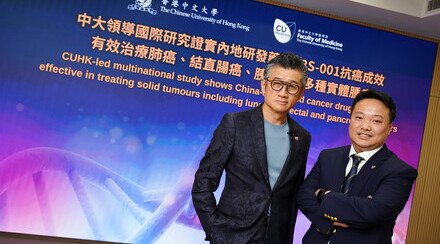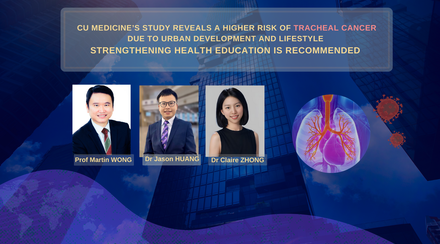Professor Tony MOK Honoured with the ESMO Lifetime Achievement Award Recognising His Global Leadership in Defining Lung Cancer Treatment Standard
Professor Tony Shu Kam MOK, Chairman of the Department of Clinical Oncology and Li Shu Fan Medical Foundation Professor of Clinical Oncology of the Faculty of Medicine at The Chinese University of Hong Kong (CUHK), is bestowed with the European Society for Medical Oncology (ESMO) Lifetime Achievement Award, one of the most prestigious international honours and recognitions given to cancer researchers, for his contribution to and leadership in lung cancer research worldwide. Professor MOK is the first Chinese to receive this Award. He is considered as “a legend in medical oncology” and “the first one to really put in practice personalised medicine in advanced lung cancer”. His main research interest focuses on biomarker and molecular targeted therapy in lung cancer. Much of his research has shifted the treatment paradigm and defined the current management of lung cancer.
Professor MOK as the World’s First to Put in Practice Precision Medicine in Lung Cancer
Trained in Canada, Professor MOK returned to Hong Kong and joined the Faculty of Medicine at CUHK in 1996. His work encompasses clinical research on oncogene driven lung cancer and the application of immunotherapy.
In the past, the only treatment for advanced lung cancer was chemotherapy, killing both cancer cells and normal cells at the same time. The average survival of these patients was only a few months.
In 2009, Professor MOK published the IRESSA Pan-Asia Study (IPASS), which is a landmark study that established for the first-time targeted therapy as the first-line treatment in adenocarcinoma patients harbouring epidermal growth factor receptor (EGFR) mutation. It proved that targeted therapy in non-smoking Asian adenocarcinoma patients has a higher efficacy than the conventional intravenous chemotherapy. Furthermore, in 2014, Professor MOK published another study proving that molecular targeted therapy is superior to standard first-line chemotherapy in ALK-positive lung cancer patients.
The major breakthroughs in the clinical studies led by Professor MOK have found a new treatment paradigm for mutated lung cancer. Currently, doctors will check for EGFR or ALK mutation before prescribing a customised treatment plan. For patients with EGFR mutation or who are ALK-positive, targeted therapy will be the first-line treatment. This puts personalised medicine into practice which helps cancer patients live better and for longer.
However, when EGFR mutation is being targeted by the therapeutic agent, cancer cells will further mutate, and a new driver oncogene will emerge. This is why patients with EGFR mutation develop resistance after first-line targeted therapy. Professor MOK’s research highlights the need for patients to be continuously monitored on how cancer evolves in their bodies. Once the disease progresses on first-line treatment, further mutation tests should be considered to customise the treatment.
Chemotherapy is the current standard treatment if no driver oncogene is found nor appropriate targeted drugs are available. In recent years, immunotherapy has emerged, bringing hopes and more treatment choices to patients. The application of immunotherapy is another focus of Professor MOK’s research interest.
Professor MOK has led multiple multinational studies and contributed to over 220 articles in prestigious international journals, including the New England Journal of Medicine (NEJM) and The Lancet. He transformed the treatment practice for patients whose cancer genes further mutate and develop resistance after first-line EGFR targeted therapy in 2016. This study was selected as one of the ten most “Notable Articles of 2017” by the NEJM.
Honoured as “a Legend in Medical Oncology”, Being the First Chinese to Receive this Honour
ESMO, one of the leading professional organisations for medical oncology in the world, has recently presented the Lifetime Achievement Award to Professor Tony Mok for his practice changing contribution to lung cancer. This Award is one of the most prestigious international honours and recognitions given to cancer researchers.
Professor MOK said, “I am most grateful and humbled to have been chosen by ESMO to receive this honour. I am deeply indebted to all my local and global collaborators for their selfless support over the past two decades. This Award is not only a significant encouragement to me, but also an acknowledgement of the Asian researchers for their contributions to personalised medicine.”
At the award presentation ceremony, Professor MOK highlighted the significance of “friendship” and “collaboration”. He said, “As a clinician-scientist, my duty is to create hope for patients. My achievement is to create hope with likeminded friends.”
Dr. Evandro de AZAMBUJA, Chair of the ESMO Fellowship and Award Committee, lauded Professor MOK’s work and said, “MOK is a legend in medical oncology. He was the first one to really put in practice personalised medicine in advanced lung cancer with the use of targeted therapy. His research has led to a change of treatment paradigm for lung cancer patients and helped define the current practice.”
In addition to presenting the Lifetime Achievement Award to Professor Tony Mok, this year ESMO also honored Professor Jean-Charles Soria, Senior Vice President and Head of the Oncology Innovative Medicines Unit at MedImmune with the ESMO Award; Professor Pasi A. Jänne at Harvard Medical School with the Award for Translational Research; and Dr Margaret Foti, Chief Executive Officer of the American Association for Cancer Research with the Women for Oncology Award.
About the European Society for Medical Oncology (ESMO)
With 18,000 members representing oncology professionals from over 150 countries worldwide, the European Society for Medical Oncology (ESMO) is the world’s largest society of reference for oncology education and information. ESMO is committed to offering the best care to people with cancer, through fostering integrated cancer care, supporting oncologists in their professional development, and advocating sustainable cancer care worldwide.

Professor Tony MOK (2nd from left), Li Shu Fan Medical Foundation Professor of Clinical Oncology and Chairman of the Department of Clinical Oncology of the Faculty of Medicine at CUHK, is bestowed with the European Society for Medical Oncology (ESMO) Lifetime Achievement Award for his practice changing contribution to lung cancer. Professor Mok is the first Chinese to receive this award. (Photo courtesy of the European Society for Medical Oncology)

At the award presentation ceremony, Professor Tony Mok highlighted the significance of “friendship” and “collaboration”. He said, “As a clinician-scientist, my duty is to create hope for patients. My achievement is to create hope with likeminded friends.” (Photo courtesy of the European Society for Medical Oncology)












































































